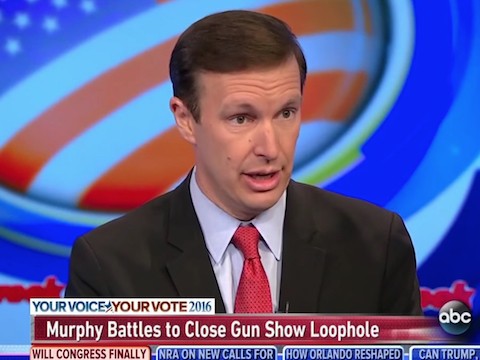Sunday on ABC’s “This Week,” network White House correspondent Jonathan Karl grilled Sen. Chris Murphy (D-CT) on if any of his gun control proposals would have stopped the recent mass shootings.
Partial transcript as follows:
KARL: So Senator Murphy, you are getting those votes on Monday, tomorrow.But are you going to have to look those families in the eye once again and tell them that you have failed? Because those things are — those are not going to pass, none of them.
MURPHY: Well, listen, we’ll still work hard over the weekend on the bill that would stop people on the terrorist watchlist from getting guns. I admit that the background checks bill is going to be tough to get 60 votes on, but we still have hope that we can get Republicans to support the bill, stopping terrorists from getting weapons. But, listen, I think something important happened last week. It wasn’t just that 40 senators came to the floor and supported my effort to get these votes but there were millions of people all across the country who rose up and who joined our effort. And what we know is, ultimately, the only way that you win this issue is by building a political infrastructure around the country that rivals that of the gun lobby. And so I’m still hopeful that we’re going to be able to get votes; I know there are also some compromise negotiations happening that may bear fruit. But in the final analysis, what may be most important is that our filibuster helped galvanize an entire country around this issue.
KARL: But you specifically are pushing a bill and have been pushing a bill and it will be voted on on Monday to close the so-called gun show loophole. Would that have done anything to stop the massacre in Orlando?
MURPHY: So it may — yes, it may have in the sense that if you partner it together with a bill that stops terrorists from —
(CROSSTALK)
KARL: But wait a minute, he didn’t buy those guns at a — at a gun show. And he would’ve passed a background — he did pass a background check.
MURPHY: He did pass a background check. But if the Feinstein bill was in effect, the FBI could have put him on the list of those who are prohibited from getting guns. And what if he went into the gun store and was denied? Then he could’ve just gone online or to a gun show and bought another one.
KARL: OK, but what I’m trying to get at is we hear every time there’s one of these terrible tragedies —
MURPHY: I understand.
KARL: There’s these proposals. Your proposal would’ve done nothing in the case of Orlando. It would’ve done nothing to stop the killing in San Bernardino and in fact was — is unrelated to the killing in Newtown. So why — I mean, why — I mean, why are we focusing on things that have nothing to do with the massacres that we are responding to?
MURPHY: Well, so first of all, we can’t get into that trap. I disagree. I think if this proposal had been into effect, it may have stopped this shooting. But we can’t get into the trap in which we are forced to defend our proposals simply because it didn’t stop the last tragedy. We should be making our gun laws less full of Swiss cheese holes so that future killings don’t happen. That trap is an impossible one. The Sandy Hook families lobby for background checks. You know why? Because they’re just as concerned with the young men and women who are dying in our cities because of the flow of illegal guns as they are about a ban on assault weapons or high magazine clips that might have prevented the Newtown killing. So this has to be broader than just responding to the tragedy that happened three days ago.
KARL: But why can’t Congress pass things that there’s obvious agreement on? For instance, the question of the terrorist watchlist. There’s opposition to banning gun sales for people on that list — people have constitutional concerns — but why can’t you simply pass a provision that says that anybody who is a on a terrorist watchlist or has been on a terrorist watchlist for the last five years, tries to buy a gun, the FBI is automatically notified?
MURPHY: Yes.
KARL: I mean that — at least they could follow the person, they could track the person.
Why can’t Congress at least do that?
MURPHY: Well, first of all, does the FBI have the resources? I mean that’s a question, to take those notifications, especially if the individual walks out of the store with the gun, and stop the killing before it happens? It would be much more effective to make sure that the individual doesn’t get the gun rather than to make the FBI go find him after he gets it. I think there is consensus here. And so, as we speak, there are discussions happening, in addition to these votes that we’re having —
KARL: Really, with the Republicans?
MURPHY: — yes, that might bear fruit. And the fact is none of that would’ve happening if we didn’t stand up and conduct that filibuster. We were just going to go on, like business as usual. And so we’re going to try to get the votes on Monday night. If we don’t, there are compromise negotiations happening. I don’t think any of that would’ve occurred if we hadn’t taken a stand.
KARL: All right, Senator Murphy, thanks for coming to talk to us about it.
MURPHY: Thanks a lot.
Follow Pam Key on Twitter @pamkeyNEN

COMMENTS
Please let us know if you're having issues with commenting.